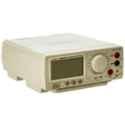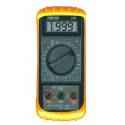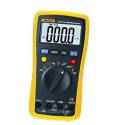Translate:
Multimeter Buying Guide - Things to consider before buying
Back in the days when technology wasn't much-developed, people used traditional voltmeters and ammeters for measuring voltage and current. But eventually, these conventional methods had certain drawbacks associated withem. These meters were heavy to carry, couldn't store data, and caused damage to the permanent magnet due to heat.
Subsequently, people felt the need for a more potent device that could overcome the drawbacks of the ammeters and voltmeters. Hence, the first revolutionary multimeter was invented by Donald Macadie in the 1900s. He called it AVO (Ampere-ohm-volt) meter as it could measure all three quantities altogether.
Technically a multimeter is a device that can measure various quantities simultaneously. Further modifications included that the analog displays were replaced by LCDs, other quantities (like frequency, capacitance, and temperature) could be measured, and many more innovations were made to the multimeters.
RMS Multimeters can measure the parameters irrespective of their waveform and this was another breakthrough in multimeters. The frequency over which the multimeters usually worked was enhanced and ultimately widened. Today, we have modern multimeters that can store data in their internal memory. Some multimeters also have features like Bluetooth connectivity which enables us to store and manage the data personally on our devices.
As one can notice numerous breakthroughs were done to the multimeters so that they can fulfill current needs. But then what are the types of multimeters? What criteria should you concern before purchasing a multimeter? Let's take a look at both of these questions!
Types of multimeter:
Analog Multimeter
Remember those petite devices with scales and readings on them and a needle pointing to the reading that was being calculated. Well, those are the typical analog multimeters. These voltage meters can measure current, resistance, AC, and DC voltage signals.
Apparently, these days the analog multimeters are replaced by their escort i.e., the digital multimeter. It is because the analog multimeters show less resistance and hence high sensitivity which makes them cumbersome to use.
Also, there might be difficulty in reading the scales to a new person who doesn't have proper knowledge of using them. The advantage of using an analog multimeter is while checking diode readings they show the most accurate results than their counterparts.
Top Sellers

HTC DM-8045R Digital Multimeter
₹785314% OFF₹5702

Kusam Meco 108 Digital Multimeter
₹144610% OFF₹1092

Mextech 115 Digital Multimeter, AC Voltage Range: 4-750 V
₹147710% OFF₹1126
Digital Multimeter
As the name suggests these meters have digital methods of display which are LEDs or LCDs. Also called smart multimeters can be used to measure voltage, current, and frequency. As these instruments show automatic display the chances of human error are almost negligible in comparison to the traditional analog ones where one must have good eyesight to take accurate readings.
These smart multimeters provide more precise readings as they can show results up to four decimal places which are not possible in the analog multimeters. Thus, accuracy is ensured.
DMMs have auto-polarity functions i.e., one can record negative voltages if the probes are oppositely placed. Whereas it can be done in analog as the opposite polarity causes breakages in it.
Nevertheless, these types of devices are expensive, and yet they cant bear fluctuations. If there are any fluctuations while taking measurements then the accuracy of results gets hindered. Also, it is difficult to find a digital multimeter for our particular needs.
List of Essentials Things to Consider While Buying Your Digital Multimeter
- Know the usage: If you want a multimeter merely for household needs then a digital multimeter won't be an apt choice. These multimeters are specialized for use in industrial areas where accuracy and reliability are a must. For home uses there is no point in purchasing an expensive DMM.
- Check the measurement range: As these meters can measure current, voltage, and frequency do check the range on which they can work. Once you know the range of DMM you will need then you can get an equal multimeter. Some multimeters can also detect AC and DC voltages therefore, you must check both AC and DC ranges as they are different.
- Temperature detection: If you need a best multimeter to monitor thermal outputs several times then you can buy a digital thermometer with a dual differential thermal function. This way you can detect two temperatures at the same time.
- Accurate RMS readings: It is easy to detect and provide a reading of an AC waveform but if the wave diverts from this behavior and shows sine waveform then the difficulty arises. In such cases, we need a true RMS recording digital multimeter instead of a mere RMS multimeter.
- Resolution: Opt for digital multimeters with a higher resolution such that they show results up to at least 4 decimal places. This ensures accuracy to maximum levels.
- Accuracy: The results displayed on the multimeter should be accurate and error-free. After all, you are spending enormous amounts of money on this digital instrument and you deserve accurate results at the most.
- Always go for a DMM that requires a higher voltage than that is required for other devices to work.
- Automatic ranging: If you need a best multimeter to measure various quantities simultaneously then choose the one with auto-ranging options. You merely need to select AC/DC, current, voltage, etc. and the rest will be taken care of by the multimeter. This function is quite helpful and provides much ease while operating.
- Safety standards: This is the most crucial thing to consider while buying a digital multimeter. If you are buying a digital multimeter for industrial purposes then you must check all the safety standards to assure proper safety to your laborers.
Conclusion
Ultimately, in today's modern era where industrialization is at its peak the use of modern devices is a must. Good quality DMMs will not only minimize the efforts but will guarantee accurate results maximum times. If you require a multimeter for household uses then you can choose analog multimeters without any hesitation. These are perfect for domestic uses and can show accuracy as well.
The next time you are all set to buy a digital multimeter make sure to reminisce about these key points and get yourself a multimeter that meets all these standards as well. Also do check multimeter prices at moglix and find a wide range of multimeters of various brands.
Multimeters: FAQs
Q. What are multimeters used for?
A. A multimeter is an electrical device used for measuring two or more than two electrical values. It is mainly used for measuring the current (amps), voltag (volts) and resistance (ohms).
Q. How does a multimeter work?
A. Most of the multimeters naturally measure the voltage and then pass the current to be measured through the shunt resistance. This measures the voltage built across it.
Q. Which multimeter is best?
A. Here are few of the top multimeters available in the market.
- INNOVA 3320 Hands Free Meter
- Fluke 87-V- Best Electrical Digital Multimeter
- Klein Tools MM600 Multimeter
Q. What are the three main functions of the multimeter?
A. The 3 main functions of the multimeter are:
- Measuring the voltage
- Measuring the resistance
- Making the Continuity test
Q. What should you not do with a multimeter?
A. Here are few things which you should avoid while using a multimeter,
- Do not use it if the protective insulation is damaged
- Do not connect it directly to any AC or DC source




